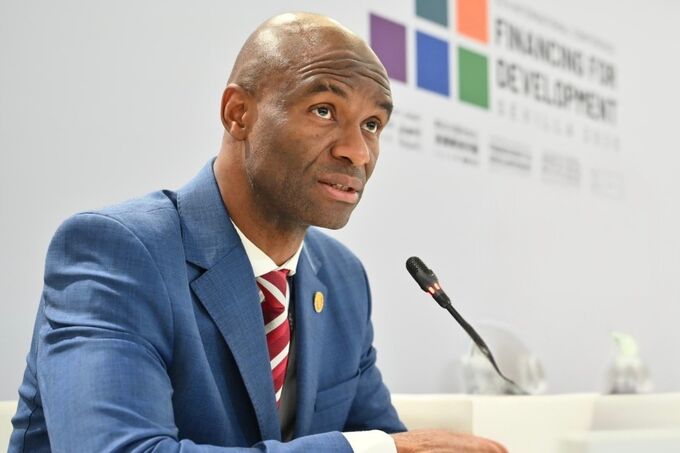
News
Creating inclusive instant payment systems via digital public goods
by Djeinaba Kane, Advocacy and Partnership Lead, AfricaNenda - 29 October 2023

Questions to Michael Mbuthia, Director Eastern Africa at AfricaNenda
AfricaNenda is working closely with development partners and philanthropic programs across Africa to achieve universal financial inclusion by 2030.
Through pre-project support, capacity building, policy advocacy, and technical assistance, AfricaNenda has supported programs and tools promoting the growth of inclusive instant payments systems (IIPS) in Africa. In this first edition of "Voices of Expert", we are highlighting our work on digital public goods in addressing inclusivity in the design of IIPS.
In our recent AfricaNenda blog on The Vital Role of Inclusive Payment Systems in Africa's Financial Inclusion Journey, we looked at the need for more inclusivity in payment systems in order to provide access to financial services to all people regardless of location (urban and rural), socioeconomic status (poor or more financially excluded population), or whether they have a bank account. Challenges encountered in Africa in addressing inclusivity in the design of instant payment systems include, among other things, the low levels of collaboration amongst large players such as banks and fintech’s in the ecosystem; the high cost of delivery of payment systems due to infrastructure and digital constraints in most African countries combined with limited consumer literacy; and, the limited involvement of nonbank financial service providers in the formulation of governance structures and payment schemes. In this Q&A, we delve into how the work of AfricaNenda with is creating interoperable payments platforms connecting all digital financial providers and customers, especially the financially excluded, has is poised to contribute to addressing inclusivity challenges in Africa such as cost factors and contributed to designing IIPS in Africa. Our spotlighted expert, Michael Mbuthia, AfricaNenda’s Regional Director for Eastern Africa, provides us with more insights from this collaboration.
Can you, in your own words, explain what a Digital Public Good is?
A Digital Public Good payment platform, in my view, is a complete mind shift on how a national payment infrastructure can be built and deployed. In the traditional payments’ world, there is a huge misconception that building a national payment infrastructure is costly, complex, and turbulent. But the reality is that they do not need to be, digital public good payment solutions are helping debunk these misconceptions.
The fundamental framework of must be based on the Level One Project (L1P) principles that outline a vision of how an inclusive digital financial services system can work for the benefit of poor people. The underlying design principles of the L1P Guide include:
- A push payment model with immediate funds transfer and same-day settlement.
- Open-loop interoperability between providers.
- Adherence to well-defined and adopted international standards.
- Adequate systemwide shared fraud and security protection.
- Efficient and proportional identity and know-your-customer (KYC) requirements.
- Meeting or exceeding the convenience, cost, and utility of cash.
How does a Digital Public Good (DPGs) address challenges to implementing inclusive IPS?
From a technology standpoint, new approaches now exist to implement Inclusive IPS. Indeed, these approaches have begun to replace the “hardware plant” monolithic approach to building payment infrastructure, which in some cases is problematically unscalable. In some instances, a free open-source tool is optimized for developing economies, provides toolkits for developers and business managers, and a training guide*. The platform greatly assists in reducing the complexity and effort required for designing, deploying, and managing IIPS, and they specifically address the challenges below:
- Infrastructure Costs: Developing and maintaining the necessary infrastructure for a national payment system can be a significant cost factor. This includes building data centers, networks, and payment processing systems. The costs associated with hardware, software, and ongoing maintenance can be substantial. By leveraging on a mix of open-source components to deliver infrastructure agnostic framework, costs will significantly reduce.
- Implementation Costs: National payment systems often need to integrate with various financial institutions, payment processors, and other stakeholders in the financial ecosystem. These integrations can involve significant costs related to developing interfaces, APIs, and compatibility testing across different platforms and systems. Out of the box core API components ensures that common Core Banking platforms can easily be integrated into these DPGs.
- Maintenance and Upkeep Costs: Once a national payment system is implemented, ongoing maintenance and system upgrades are necessary to keep it secure, efficient, and up to date with changing technologies and customer demands. These costs can include regular system updates, bug fixes, customer support, and infrastructure scaling. By tapping onto open-source community of skilled professionals, bug fixes and customer support issues can be quickly resolved by a wider pool of experts which in the long run reduces maintenance costs.
- Improved Interoperability: Ensuring interoperability between different payment systems and service providers within the national ecosystem can be a complex and expensive undertaking. DPGs allow the industry to fast track the development of common standards, protocols, and interfaces to facilitate seamless transactions across different platforms and providers and supports required investment in coordination and technical development.
It is important to note that ethical and legal considerations in implementing IIPS are both essential and complex. Issues such as privacy, data protection, consent, and accountability need to be addressed appropriately. Ensuring that the collection, storage, and use of data are done in a transparent and responsible manner are crucial to protect individuals' rights and foster trust in an IIPS and enabling digital sovereignty to countries adopting this open source.
*Among the open-source tools used: Kubernetes, Docker, Helm, Ansible, Terraform, Prometheus, Grafana and Jenkins.
What is the role of AfricaNenda in the IIPS ecosystem:
In its mandate to accelerate Inclusive Instant payment systems infrastructure on the continent, AfricaNenda works with stakeholders to:
- Support project owners in defining IIPS project objectives and design principles, through project definition and vision.
- Support project owners in developing project work plans and budgets, and identifying project facilitators, technical assistance, and IIPS implementation partners, through scheme design and structuring.
- Determine the economic feasibility of potential IIPS deployment, to assess whether deployment is inclusive, and to identify areas in project design where it can provide support, through readiness assessments; and
- Generate interest in IIPS by disseminating information, meeting with potential project owners, and convening key private sector stakeholders, through advocacy and policy support.


